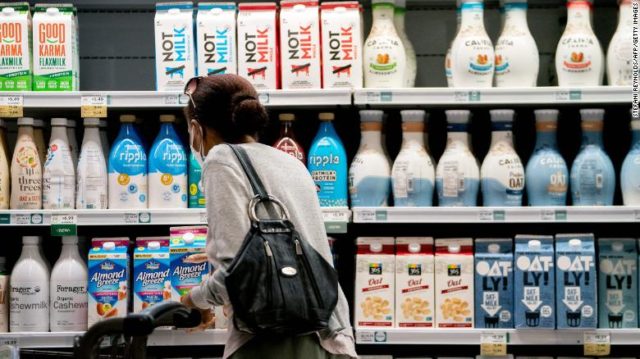(CNN) — Krista Johnson gets anxious when she thinks about the rising cost of gas, food and housing as she prepares to give birth to her daughter, who is due in August.
Johnson said she’s been trying to save money by cooking more at home and packing her husband’s lunches instead of eating out at restaurants. The metro Atlanta couple postponed buying a house after watching home prices soar in the last year. Johnson, an elementary school teacher, is also concerned about being able to afford child care which is getting more expensive nationwide.
“I’m just worried about quality of life,” said Johnson, 33. “You already have nerves about being a new parent. And then you have the whole economic downturn possibly coming and it can create some anxiety.”
Like many Many Black families, Johnson and her husband are bearing the brunt of inflation — with prices rising to the highest rates the US has seen in more than 40 years. Researchers say Black families will suffer the worst effects of rising inflation because they lag behind their White counterparts in income, wealth, financial savings and home ownership.
The disparity leaves many Black Americans without the funds to help offset the rising consumer prices and puts greater pressure on their monthly income, economists say. Some economists fear that if lawmakers don’t act soon to combat inflation, Black families may be forced to go without necessities as the threat of another recession looms.
“It’s going to be extremely devastating,” said William Darity Jr., professor of public policy, African American studies and economics at Duke University. “People will have to make very, very hard decisions about whether or not to purchase medicines or buy food or forgo payment of their utilities. It will have harsh effects on people’s well-being.”
Darity said the nation’s wealth gap has made is difficult for Black families to maintain financial savings or transfer wealth through generations like many White families have been able to do. He said racist policies such as redlining and depriving former slaves of land promised to them have historically set Black Americans behind.
According to the Brookings Institute, the median wealth of a White household is $188,200 which is 7.8 times more than the average Black household at $24,100. In 2019, the home ownership rate for White Americans was about 73% compared to 42% for Black Americans.
Darity is urging lawmakers to implement a federal job guarantee which would provide a job with dignified wages and safe working conditions to every adult who seeks employment. This would help Black families stay afloat, Darity said.
President Joe Biden insists that tackling inflation remains a top priority for him, but he faces an uphill battle with a narrowly divided Senate that has blocked most of Biden’s domestic agenda.
“The problem is Republicans in Congress are doing everything they can to stop my plans to bring down costs on ordinary families. That’s why my plan is not finished and why the results aren’t finished either,” Biden said earlier this month.
A disproportionate impact on Black families
Some research suggests that Black households are more susceptible to inflation changes than White households.
A study published by the Federal Reserve Bank of Minneapolis found that necessities such as groceries, electricity, and wireless phone service make up a larger share of Black families’ budgets. Black households are also spending a larger portion of their income on goods and services with prices that change more often, the study said.
Munseob Lee, an economist at the University of California-San Diego who co-wrote the study, said many Black Americans are also living in food deserts and paying higher prices for groceries at convenience stores. Inflation only increases the price on those convenience store products, Lee said. It also forces Black shoppers to have to travel father for groceries meaning they are subject to the higher gas prices, he said.
“If prices paid by White households increase by 7% over a year, our calculations suggest that one may expect them to increase by 7.5% for Black households,” the study notes as an example.
Johnson, the Atlanta mom, noted that if Americans don’t get a raise at their job, the rate of inflation will equate to a pay cut.
“I think a lot about money and I think a lot about finances and I wonder are our salaries going to start to match (the rate of inflation),” Johnson said.
‘It costs more to be poor’
Some non-profit organizations are stepping in to help families put food on the table as inflation continues.
Elizabeth Omilami, CEO of the Atlanta-based Hosea Helps, said she has seen a 40% increase in the number of families she serves food boxes to weekly since April.
Omilami said she is also overwhelmed with requests from people who need assistance paying their rent. Many families, she said, are struggling with inflation because someone in the household lost their job during the pandemic or they are senior citizens on a fixed income. Other families say their food stamps are not enough to cover the rising cost of food, Omilami said.
“It’s so sad to see people who worked all their lives, pouring their taxes into the economy of this country and now they cannot benefit from it,” Omilami said. “When you see Black families earning 15% less than the average White family and you see them shopping because they are living in food deserts near these convenience stores where everything is priced higher than it would at a supermarket … then it costs more money to be poor.”
One suburban Atlanta mom said she has had to make major adjustments to where she shops for groceries and what her family eats.
Crystal Smith, a single mom of four, said she now spends more time comparing prices at different stores to see how she can save money. During a recent week, she decided to cook chicken over a seafood boil for her family because it was the more affordable meal.
The price of gas is also putting a dent in her budget, said Smith, who works as a talent acquisition manager. She commutes 30 minutes to work and it costs $75 to fill up her tank. Prior to inflation, Smith said she was only paying about $28 for a full tank.
“It’s one of those things that definitely has you sitting back wondering how you can cut costs,” Smith said. “We are really in such a rough time and we have to start making difficult decisions, especially in the African American community.”
The-CNN-Wire
™ & © 2022 Cable News Network, Inc., a WarnerMedia Company. All rights reserved.


































